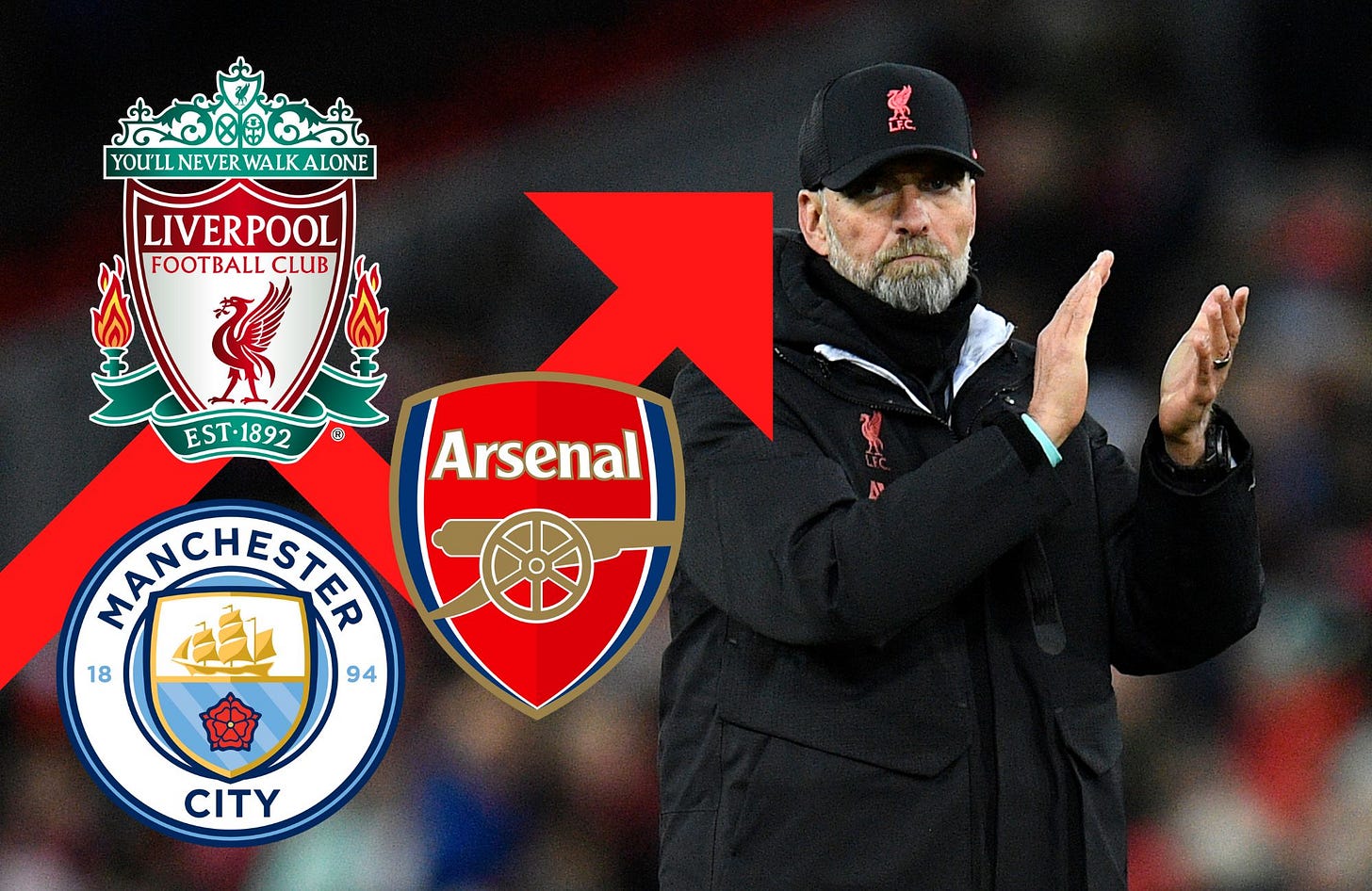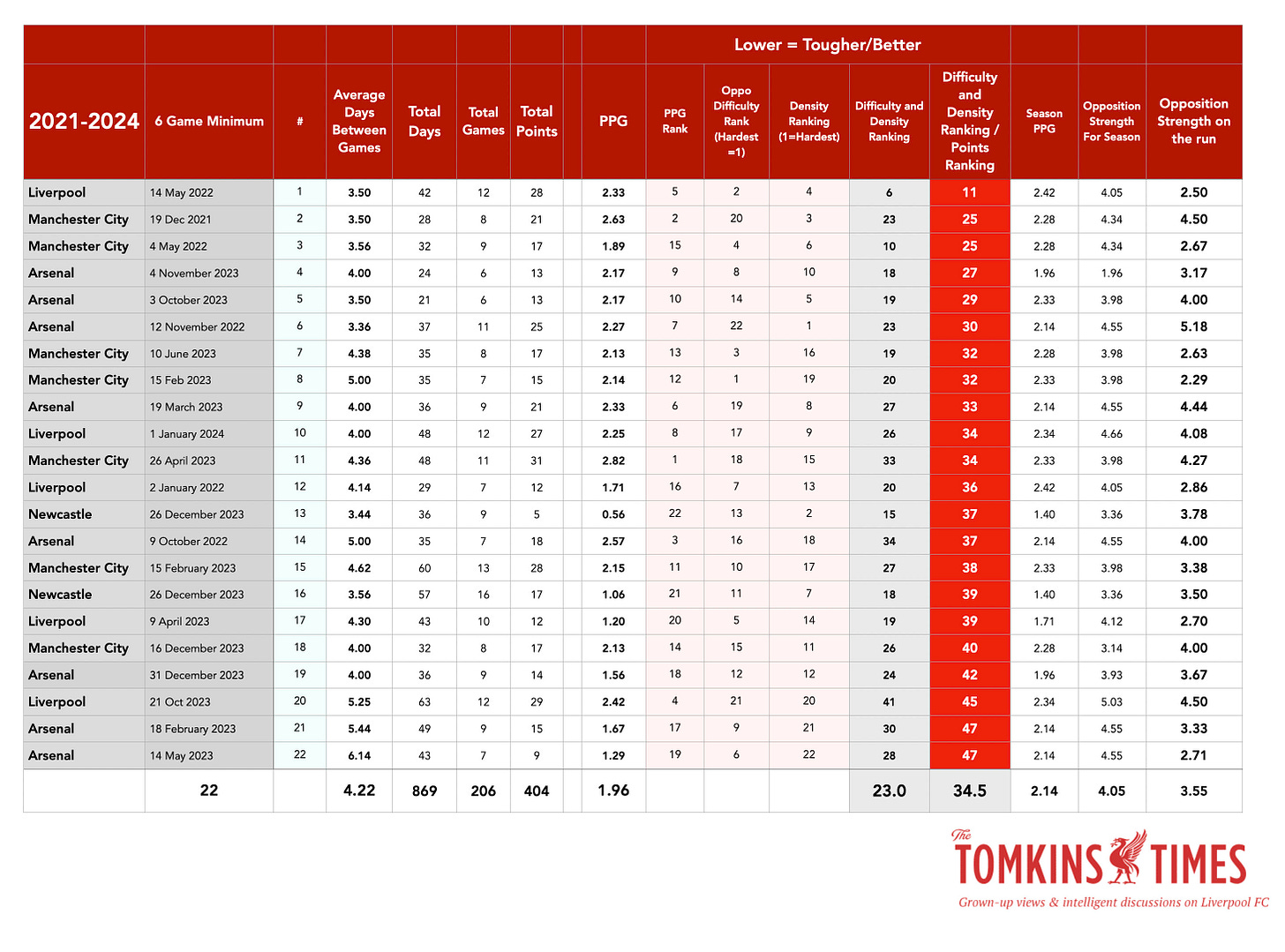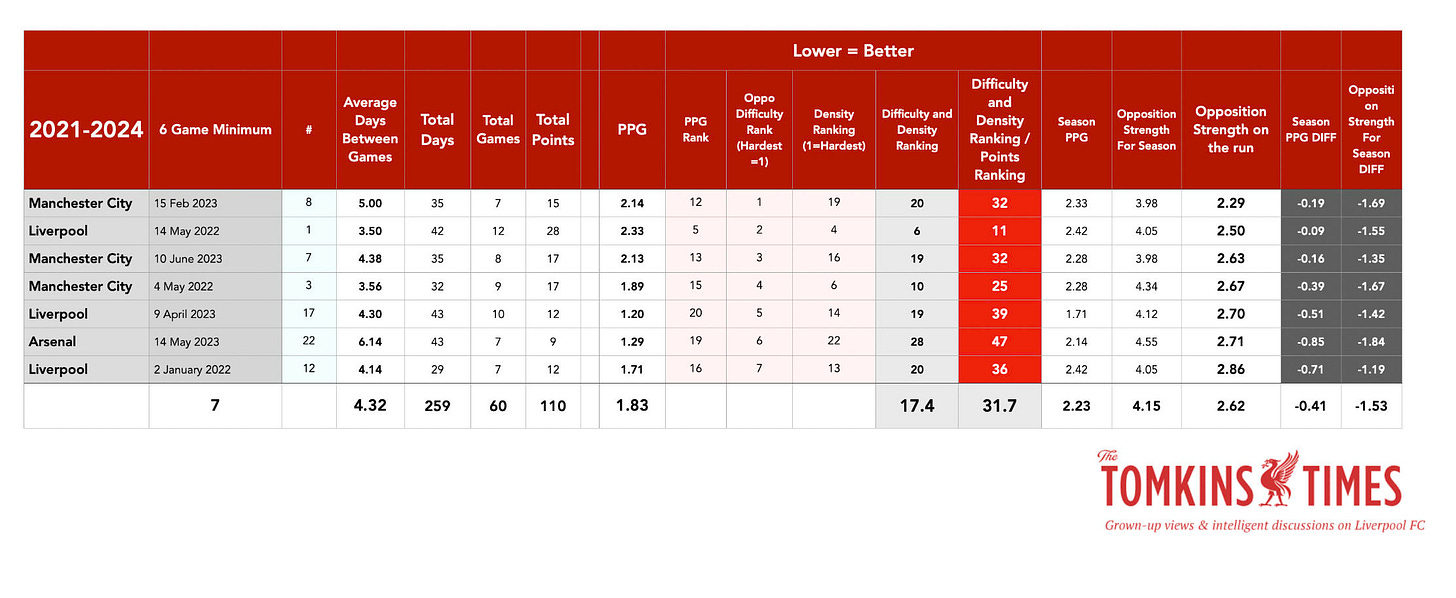Title Run-In - Fixture ‘Density’ and ‘Intensity’ Ratings Updated – It Get Easier For Liverpool
(And Harder for Man City and Arsenal)
While Arsenal have the luxury of no FA Cup games, as Liverpool (having beaten them at the Emirates) unhelpfully slog it out at Old Trafford, and Man City face a Newcastle side that may have rediscovered some mojo by mid-March, the Gunners have by far the toughest final third of the season; especially if they overcome the 1-0 deficit to Porto, as I’d expect them to do at home.
But Arsenal’s run-in is further complicated by the mid-March test of Chelsea at home postponed and now needing to be squeezed into an already insane run-in, unless it’s brought forward (but there appears no time for that).
I’d already said that the first half of 2024 would allow Man City to close the gap, but highlighted Chelsea at home as a potential breaking point on some long winning run. And that Arsenal had it easier until the spring, before it turns hellishly tough.
Arsenal have two more very winnable games before the international break, but with Porto three days after Brentford at home, it could be that they have one eye on the vital Champions League game.
(One thing I’ve found over the past 20 years is that sometimes it’s the game before the big European game where the drop-off occurs, as well as the risk after.)
As you can see from Arsenal’s run-in, with no obvious place to reschedule Chelsea (who like Newcastle are still strong on paper, but inconsistent on the pitch) prior to the international break, a run to the Champions League semi-finals would be gruelling.
Their underlying numbers are superb, but in part due to not having gone to Man City, Brighton, Man United and the huge test at Spurs; or faced Aston Villa and Chelsea at The Emirates. So their numbers are also a bit inflated by easier games on paper.
My point with Fixture Density and Intensity is that the more tough games you play in the shorter space of time, the greater the multiplication of risk of points dropping and/or injuries.
Tougher games require more effort, and are less likely to see an early winning scoreline to take off key players (or rest them entirely), and thus the risk of injuries rises.
Arsenal are deservedly near the top, but haven’t rested or rotated much, and the heft of Champions League Heavyweight/Premier League Big Clash/Champions League Heavyweight clashes is a phenomenon that first occurred to me with Arsenal’s Invincibles 20 years ago, when a much inferior Chelsea side, pre-Jose Mourinho, mugged them in the quarters; while also dropping points at home to Man United in between, and then away at Newcastle United.
Most of Arsenal’s current players have racked up a ton of minutes, and these will become intense minutes in quick succession. They are perhaps due some injuries, and the timing could be terrible; however, if they keep everyone fit and manage to take players off after 70 minutes in games, they may emerge unscathed.
But who they draw in the next rounds of the Champions League could make or break their league form. Liverpool’s insane absentee list of 14 could derail the Reds’ season, but also mean fresh players if most return soon enough; and only Mo Salah was even remotely close to half a dozen players from each of Arsenal and City for minutes at the halfway point, and he’s barely played since.
Arsenal’s run-in just looks like a bridge too far, even for the very best teams.
Even an elite team would struggle to average 2ppg (including wins/draws/defeats in cups as 3pt/1pt/0pt) with the kind of post international break schedule from March 30th (Man City away) to May 11th (Man United away), with Chelsea to be added somewhere.
You can’t tell what form or shape teams will be in later in the season; Brighton, for example, have excelled and disappointed this season; Newcastle (rated ‘2’ as they were a Champions League team this season), haven’t recovered from their own Dense/Intense period up to Christmas; and Chelsea can be brilliant on their day, but so far that’s mostly been at Spurs and Man City (which might mean they actually turn up at Arsenal).
Of the 22 most Dense/Intense runs I’ve analysed going back three seasons, only Liverpool, in 2021/22, have come through a period that Arsenal are likely to face in terms of opposition difficulty (lower = harder, as ranked from 1 as hardest to 10 as easiest) with the kind of ppg a title race hinges on.
But 92 points was not enough, by one point. The ppg in those 12 games, including Champions League quarters and semis, was 2.33, against an opposition quality rating of just 2.50.
Arsenal are looking at 13 games at a difficulty rating of 2.62, assuming that there are only top teams left by the quarter-finals of the Champions League.
Arsenal ended last season’s final ten games at just 1.2ppg, whereas no matter how chaotic or poor the season has been since 2018, Liverpool are always above 2.3ppg (unless they’ve just won the league, and it’s the pandemic, and they’re about 25 points ahead).
Arsenal are looking better now than last season (albeit their best form was still the first half of last season), but they have to get over that mental and physical barrier, now with added Champions League complications.
I found seven (out of 22) runs that averaged under 3.00 for opposition difficulty, and weirdly they averaged out at 2.62.
(The average days between games was 4.32, so more time between games than Arsenal will have as things stand.)
Most difficult runs with the date of the final match in the sequence:
Manchester City, 15 Feb 2023
Liverpool, 14 May 2022
Manchester City, 10 June 2023
Manchester City, 4 May 2022
Liverpool, 9 April 2023
Arsenal, 14 May 2023
Liverpool, 2 January 2022
From the combined 60 games in these runs, these elite teams averaged 1.83ppg, which isn’t bad at all; but under the 2ppg I suggested would be tough to reach, and extrapolates to under 70 points a season (but obviously you don’t play this level of opposition 38 times).
The whole season averages for these teams was 2.23ppg, so there’s an average drop off of 18% in points accrued. All seven runs were at a worse ppg than their season average.
Again, that’s normal.
(Obviously ‘dropping points’ in the Champions League can be unharmful if you win the other leg and qualify.)
When Liverpool recently faced Chelsea and Arsenal within days of each other, I said that it could be a two-point haul, at 1ppg; instead it was three, or 1.5ppg. Arsenal were the winners in more ways than one.
But I also said the Reds’ ppg would likely be perked up vs Burnley, Brentford and Luton, which may seem obvious (and those games are never a foregone conclusion), but three easier games in a row is less demanding in every respect. I also noted that the only real challenge for City was Chelsea at home in recent weeks, and Chelsea got a point. You may drop some points against weaker teams in a season, but it seems less likely in a fully focussed run-in.
Now, Arsenal may go out of the Champions League at home to Porto. If they did, their run-in gets much easier. They’re still left with a fairly tricky set of Premier League fixtures (3.33), but with 6-7 days between most games.
For Liverpool, facing Sparta Prague in the Europa League means two winnable games where they don’t even need to go full-strength, but also means the greater likelihood of a tougher next round (Brighton? Roma? Leverkusen?), and more fixture pile-ups; just as beating Southampton with 14 first-team players absent gave the reward of an unhelpful battle at Old Trafford.
Either side of the international break, Man City face a 13-game run that is itself below 3.00 (and have a tough league game postponed due the FA Cup, as do Liverpool and Arsenal), so high difficulty.
Last season they had a weird run-in when every tough game was in between a really easy game, so the difficulty never reached breaking point.
They can always buck the trend of 2023/24, but so far this season they’ve lost to Arsenal, Aston Villa (and Wolves), and dropped points against Chelsea, Liverpool, Spurs and Chelsea again (plus Palace); and failed to beat Arsenal in the Community Shield, and lost to Newcastle in the League Cup.
So far, they’ve not convinced against the better sides, but are battering the minnows.
**For City’s run-in and Liverpool’s run-in (and how the emerging kids may play a role), the analysis is for paying subscribers only.**
Keep reading with a 7-day free trial
Subscribe to The Tomkins Times - Main Hub to keep reading this post and get 7 days of free access to the full post archives.






